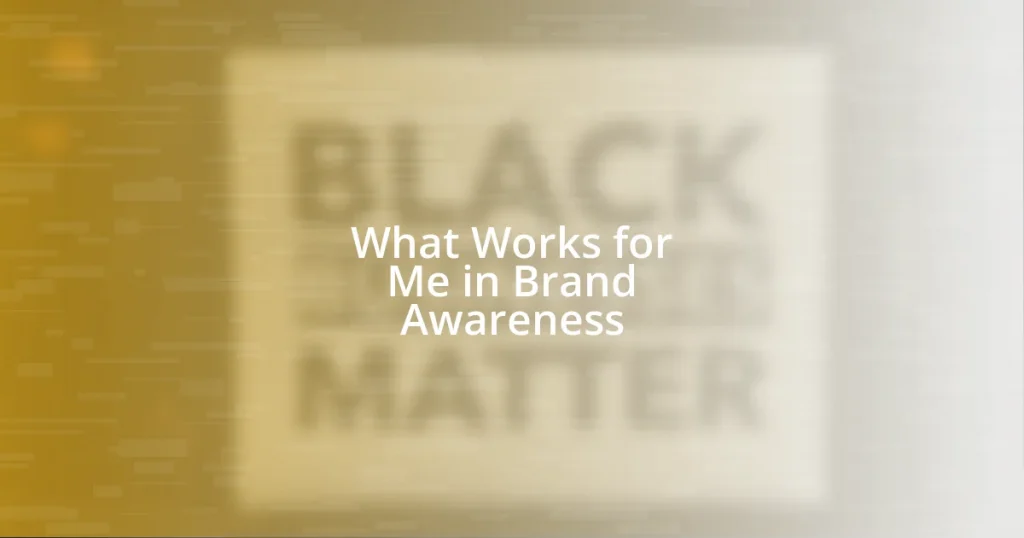Key takeaways:
- Ethical marketing focuses on honesty, transparency, and responsibility, fostering trust and loyalty between brands and consumers.
- Transparency in marketing enhances customer engagement, loyalty, and accountability, building a stronger reputation for brands.
- Building trust involves open communication, consistency in messaging, and authentic storytelling, leading to deeper emotional connections with consumers.

Understanding ethical marketing practices
Ethical marketing practices revolve around honesty, transparency, and responsibility. I remember a time when a company I admired went under scrutiny for misleading claims about its product. It made me realize how crucial it is for brands to build trust with their audience, as trust fosters loyalty and ensures long-term success.
When I think about ethical marketing, I often wonder: how do we balance profit-making with moral responsibilities? This idea resonates deeply with me, as I’ve witnessed brands that prioritize ethical practices not only connect better with their customers but also create a positive impact in their communities. It’s about crafting messages that reflect genuine values rather than merely selling a product.
Moreover, ethical marketing isn’t just a buzzword—it’s a commitment to doing what’s right. Embracing this approach has transformed the way I view marketing campaigns. For instance, seeing a brand genuinely support social causes brings an emotional connection that can’t be replicated with traditional tactics. This experience has taught me that when companies lead with ethics, they often find themselves thriving in an ever-demanding marketplace.

Importance of transparency in marketing
Transparency in marketing is crucial for establishing and maintaining trust between a brand and its audience. I recall a situation where a local business openly shared its sourcing processes for organic products. This honesty not only attracted more customers but also fostered a loyal community that felt connected to the brand’s mission. It highlighted how transparency can create a feedback loop of trust and authenticity.
Here are some key reasons why transparency matters in marketing:
- Builds Trust: When brands are open about their practices, customers are more likely to believe in their integrity and make repeat purchases.
- Enhances Loyalty: Customers feel valued when they’re kept in the loop, leading to a deeper emotional connection with the brand.
- Strengthens Reputation: Companies known for their transparency often enjoy a better public image, which can be an excellent defense against negative publicity.
- Encourages Accountability: Transparent practices compel companies to uphold ethical standards, knowing their actions are visible to the public.
- Increases Customer Engagement: Open dialogue about products and practices can lead to more meaningful interactions with customers, enhancing their overall experience.
By reflecting on these points, I’ve come to see transparency not just as a strategy but as an essential element of ethical marketing that stands the test of time.

Building trust with consumers
Building trust with consumers is foundational to any ethical marketing strategy. I can recall a time when a friend’s startup emphasized customer feedback and responded promptly to concerns. This level of engagement made customers feel heard and valued, which cultivated a strong sense of trust. I believe when brands prioritize open communication, they create a community that not only supports but champions their mission.
Moreover, I’ve observed that trust often blooms from consistency. When I follow a brand reliably delivering on its promises, it reinforces my confidence in them. For example, a company I patronized regularly maintained the same quality and service level for years, which secured my loyalty. I would argue that consistency is not just about product quality but extends to messaging and ethical practices as well. By aligning actions with the commitments made to consumers, brands can create a solid foundation of trust.
It’s fascinating to think how trust influences the customer journey. In my experience, when a brand communicates authentically about its values, it resonates with consumers on a deeper level. I remember feeling connected to a brand because it shared stories of its social impact initiatives. This emotional connection transformed my perception of them from just another option to a brand I genuinely believe in and support. Trust is indeed a language of its own in marketing; it speaks volumes about a brand’s integrity.
| Trust-Building Element | Impact on Consumers |
|---|---|
| Open Communication | Creates a sense of belonging and loyalty. |
| Consistency in Messaging | Reinforces brand reliability and builds confidence. |
| Authentic Storytelling | Fosters emotional connections and supports brand advocacy. |

Strategies for responsible advertising
One effective strategy for responsible advertising is focusing on audience education. I remember a campaign from a skincare brand that not only promoted its products but also shared educational content about skin health. This approach not only informed consumers but also empowered them to make better choices. Have you ever pondered how much more confident you feel about a purchase after understanding it fully?
Another strategy revolves around responsible targeting. I once came across a social media ad that encouraged users to limit their consumption rather than just pushing for sales. It struck me as a refreshing change. Brands can position themselves as allies in their audience’s journey, rather than just as profit-driven entities. When companies take care to reach the right people with the right message, it fosters a more respectful and ethical relationship.
Finally, utilizing social proof thoughtfully can be quite impactful. I vividly recall seeing a brand showcase real customer stories instead of relying solely on celebrity endorsements. This method resonated with me because it felt authentic. When consumers see peers validating a product rather than relying on idealized images, it builds credibility. Have you noticed how a friend’s recommendation often feels more trustworthy than a polished advertisement? Engaging content like this encourages potential customers to relate personally to a brand, sparking deeper connections.















